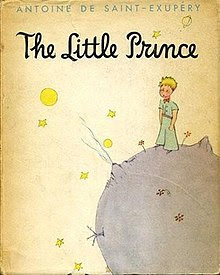"The Little Prince" by Antoine de Saint-Exupéry is a timeless masterpiece that has captured the hearts of readers for generations. This enchanting novella takes us on a magical journey, blending fantasy and philosophy to explore the complexities of life and the importance of human connections. In this review, we will delve into the captivating world of "The Little Prince," examining its remarkable storytelling, thought-provoking symbolism, and profound themes.
 |
| Source - Wikipedia |
About the Author
Antoine de Saint-Exupéry, born in 1900, was a French writer and aviator. He was known for his daring attitude, and he flew pioneering airmail routes and served as a pilot during WWII. The experiences of Saint-Exupéry affected his literary works, especially his most renowned novella, "The Little Prince." He wrote in a poetic and philosophical tone, covering themes such as love, friendship, and the human condition. His tragic death on a reconnaissance flight in 1944 added to the mystery surrounding his life and work.
The Story Unveiled
Set in the vastness of the Sahara Desert, "The Little Prince" follows the encounters of a stranded aviator who befriends a mysterious young prince from a distant asteroid. As the prince shares his extraordinary interstellar adventures, we are transported into a world of wonder and introspection. Through whimsical encounters with peculiar characters, such as the conceited Rose and the wise Fox, the prince imparts profound insights about love, friendship, and the essence of being.
Themes Explored
"The Little Prince" delves into several profound themes that resonate deeply with readers of all ages. One prominent theme is the loss of childhood innocence in the face of the adult world's complexities. Saint-Exupéry's poignant exploration of this theme reminds us of the importance of preserving our childlike curiosity and imagination in navigating life's challenges.
Emotional Resonance
"The Little Prince" stimulates a wide spectrum of emotions through its sincere storytelling. It evokes empathy and contemplation in readers by touching on topics of loneliness, longing, and the bittersweet aspect of human existence.
Multiple Messages
"The Little Prince" includes multiple messages that inspire readers to think about their own lives behind its lovely surface. It inspires us to prioritize what is genuinely important, embrace vulnerability, and rediscover the joy of simple pleasures.
Symbolism and Allegory
The novella is rich with symbolism, inviting readers to decipher hidden meanings beneath the surface. The prince's asteroid-hopping adventures and encounters represent metaphorical reflections on societal norms, the pursuit of knowledge, and the struggles of adulthood. The symbolism of the prince's beloved rose, for instance, embodies the complexities of love and the delicate balance between attachment and freedom.
Unforgettable Characters
"The Little Prince" introduces us to a cast of unforgettable characters who leave a lasting impression. The innocent and inquisitive prince embodies purity and a longing for connection. His encounters with the various inhabitants of different planets shed light on the diverse aspects of human nature, making us reflect on our own attitudes, flaws, and virtues.
Cultural Significance
Since its initial publication in 1943, "The Little Prince" has become a treasured literary classic that has been translated into several languages. It has sparked adaptations in a variety of mediums, including films, plays, and artwork, adding to its cultural relevance.
Timeless Relevance
Despite being published over seven decades ago, "The Little Prince" remains relevant and poignant in today's world. Its study of universal topics like the nature of love, the quest for pleasure, and the difficulties of growing up ensure its long-term popularity.
Philosophical Inquiry
The novella delves into philosophical ideas such as the nature of truth, the value of imagination, and the intricacies of human relationships. These philosophical themes provide plenty of fodder for intellectual investigation and debate.
What Makes "The Little Prince" Special
One of the remarkable qualities of "The Little Prince" is its universal appeal. While it is often considered a children's book, it's underlying messages and philosophical musings transcend age barriers. Saint-Exupéry masterfully crafts a narrative that speaks to the child within each of us, reminding us of the importance of nurturing our dreams, embracing solitude, and cherishing the simple joys of life.
Final Thoughts
"The Little Prince" by Antoine de Saint-Exupéry is a literary gem that continues to captivate readers worldwide. Through its poetic prose and imaginative storytelling, it imparts timeless lessons about love, friendship, and the human experience. Whether you are a seasoned reader or new to the world of literature, this book will leave an indelible mark on your heart and remind you of the profound beauty that exists in life's simplest moments.
By: Khushi Bansal




.jpeg)





0 Comments